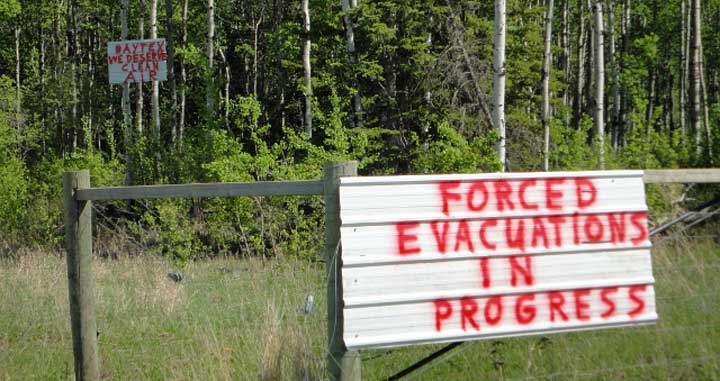A hearing examining oil emissions in the Peace River area hasn’t yet begun and already participants are attacking each others’ credentials.

The hearing, commissioned by the Alberta Energy Regulator, is mandated to examine residents’ concerns related to odours and emissions from nearby heavy oil operations and come up with recommendations for solutions and, possibly, regulatory changes.
MORE: Alberta hearing shines spotlight on oil-related health concerns
Oral proceedings begin Tuesday but participants have been filing reports to the regulator for months. In many cases, they have not just rebutted opposing points of view but called into question the credentials of expert witnesses.
Early on, lawyer Keith Wilson, who represents a group of residents from the Reno area, questioned why the regulator invited Donald Davies to participate as an independent expert.
Davies, who holds a PhD in Nutrition and Toxicology from the University of Guelph, is chairman of an environmental consulting firm. According to his curriculum vitae he has worked extensively for oil companies to provide assessments of health impacts relating to specific developments.
In his reports to the inquiry Davies concluded that there was “no obvious prospect” for emissions from nearby oil facilities to harm residents in Reno or Three Creeks – the two areas where residents had been complaining of health problems.
In a letter to the regulator, Wilson wrote that Davies’ “past work could create a reasonable apprehension of bias on the important issue of health impacts.”
When Global News left Davies a voicemail requesting comment, the energy regulator called instead.
Davies would not be available for interviews, AER’s Bob Curran said in a voicemail. “We want to ensure the proceeding is not compromised in any way.”
Oil firm Baytex Energy, which owns several oil wells and storage tanks in the Peace River area, has also taken issue with an expert’s resume.
Margaret Sears, a researcher and chemical engineer, submitted reports on toxic materials found in bitumen and wrote that many of the studies on air quality and toxicity the inquiry was considering were flawed in some way.
Baytex wrote that Sears has twice submitted affidavits on behalf of plaintiffs in lawsuits and had her evidence found inadmissible as expert opinion.
One 2009 case was an application for a class action lawsuit heard at the Court of Queen’s Bench of New Brunswick relating to spraying herbicides at CFB Gagetown. The judge found Sears’s affidavits did not “meet the test of admissibility for expert opinion evidence” as she was not a medical doctor and did not have “specific expertise” in toxicology and other subjects.
The other case mentioned by Baytex, also in 2009, also related to an application for a class action lawsuit at CFB Gagetown – this time heard at the Court of Queen’s Bench for Saskatchewan. In this case the judge decided the evidence was to be admitted not as expert opinion but instead as a summary identifying existing information on the topic.
When contacted by Global News, Sears said the regulator told her not to not give interviews, but wrote in an email that the case in question was “a long time ago.”
“My resume is available on the Proceeding website, and on that basis the AER hired me,” she wrote.
In a telephone interview, AER’s Curran told Global News that questions about experts’ credentials are “not unusual for a hearing.” Concerns and questions about the experts, he said, “will be addressed in the context of the hearing.”
Participants will have the opportunity to ask questions of all expert witnesses and other participants during the oral proceedings, scheduled from January 21 to 31. Once oral proceedings are complete, the panel will assess the information and may recommend regulatory changes.



Comments